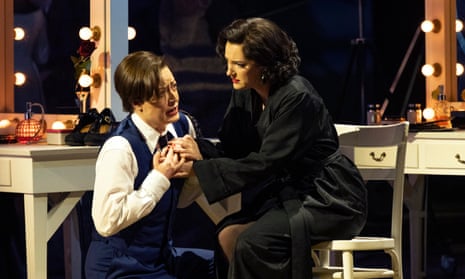Strauss collides with Fellini in Rodula Gaitanou’s production of Ariadne auf Naxos, first seen in Gothenburg in 2018, now taken into Opera North’s repertory. Gaitanou relocates the work from 18th-century Vienna to Rome’s Cinecittà studios in the 1950s, and the unseen parvenu who demands an entertainment in which an opera company and a commedia dell’arte troupe perform simultaneously has now become an autocratic film producer bent on juxtaposing serious drama with farce. The additional layer of reference doesn’t add significantly to the work, though there are many pleasures as well as occasional lapses along the way.
The opera/film shoot is performed in the original German, though the Prologue comes in a clever multilingual version by Christopher Cowell, appropriate to the international lineup of artists the producer assembles. Hanna Hipp’s Composer deals with the surrounding mayhem in English but reverts to German in moments of reflection, while the self-dramatising Prima Donna/Ariadne (Elizabeth Lewellyn) and Tenor/Bacchus (Ric Furman) hurl insults at each other in Italian. Gaitanou, meanwhile, does wonderful things with the growing attraction between Hipp and Jennifer France’s glamorous Zerbinetta, enacted with telling sincerity, the pair of them thrown off balance by their feelings for each other.

Some directors fail to link the work’s two parts adequately, but Gaitanou proves remarkably consistent here. We watch the cameras roll as the interaction between drama and harlequinade plays itself out with great subtlety, and routines rehearsed in the Prologue are subsequently seen in full. Zerbinetta’s companions have become one of Fellini’s groups of travelling musicians, though Gaitanou is less successful in her reimagining of Ariadne’s attendants as a trio of aquatic spirits, distractingly gyrating in imitation of the movements of the sea. The Composer looks on, gazing entranced at Zerbinetta, and the fireworks the producer has insisted upon – often omitted – erupt at the climax of the Bacchus/Ariadne duet.
There is some lovely singing. With her rich lower register and opulent high notes, Llewellyn makes an excellent Ariadne, the transformation from grief to rapture beautifully negotiated. France, a superb actor as always, does spectacular things with Grossmächtige Prinzessin despite a couple of moments of effort at the top, and is finely lyrical in her duet with Hipp. The latter sounds impulsively passionate throughout, though her soft singing is exquisite in moments of introspection. Furman’s tone can be metallic, but he has the staying power for Bacchus and is comfortable with the role’s implacable tessitura. Antony Hermus conducts with considerable finesse, and the playing is impeccable in its elegance and sensuous detail.

Comments (…)
Sign in or create your Guardian account to join the discussion